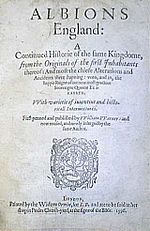William Warner (poet) facts for kids
William Warner (born around 1558 – died March 9, 1609) was an English poet and lawyer. He was well-known in his time for his long poem, Albion's England, which told the story of England through history and made him a popular writer.
A Poet's Life
William Warner was born in London, England, around the year 1558. In his famous book, Albion's England, he wrote that his father traveled with the explorer Richard Chancellor to Russia in 1553. Sadly, his father died on another trip to The Guianas in 1557.
Some historians, like Anthony Wood, believed Warner studied at Magdalen Hall, Oxford. However, there are no official records to confirm this or to show that he earned a degree there.
Warner worked as a lawyer, also called an attorney, in London. He became very respected by other writers and poets of his time. In 1599, he married Anne Dale. Their son, William, was born in 1604 in Ware, Hertfordshire. William Warner passed away suddenly in Great Amwell, Hertfordshire, on March 9, 1609.
His Works
Albion's England
William Warner's most important work is a long poem called Albion's England. It was first published in 1586 and was dedicated to Henry Carey, 1st Baron Hunsdon. This poem tells the history of England, starting from the time of Noah and continuing up to Warner's own era. It even includes the story of Mary, Queen of Scots's death.
The poem doesn't tell the history in a straight line. Instead, it mixes in made-up stories and adventures. One of the most famous parts is a romantic tale in the fourth book. It's about the love between Argentine, a princess from Deira, and Curan, a Danish prince.
Albion's England was very popular because it focused on patriotic themes and the history of the country. A writer named Francis Meres even said Warner was as good as Spenser, who was another famous poet. Meres also compared Warner to the ancient Greek playwright Euripides.
Other Writings
Besides Albion's England, Warner wrote other books. One was Pan his Syrinx, or Pipe, Compact of Seven Reedes, published in 1584. This book was a collection of short stories written in prose, which means it wasn't a poem. He also translated a play called Menæchmi by the Roman writer Plautus in 1595.
When Albion's England first came out, it had four "books" or parts. Over time, Warner added more sections. A special edition published after he died in 1612 contained sixteen books! This long poem was later reprinted in 1810 in a collection called English Poets by Alexander Chalmers.
Sources
 | William M. Jackson |
 | Juan E. Gilbert |
 | Neil deGrasse Tyson |


